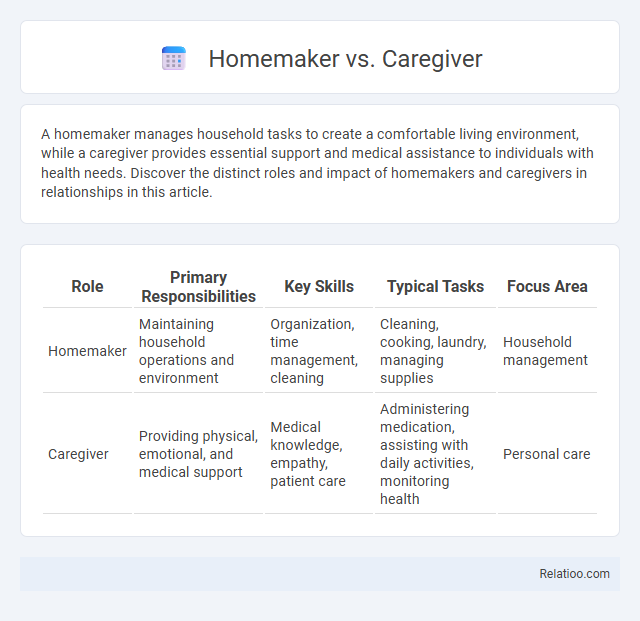A homemaker manages household tasks to create a comfortable living environment, while a caregiver provides essential support and medical assistance to individuals with health needs. Discover the distinct roles and impact of homemakers and caregivers in relationships in this article.
Table of Comparison
| Role | Primary Responsibilities | Key Skills | Typical Tasks | Focus Area |
|---|---|---|---|---|
| Homemaker | Maintaining household operations and environment | Organization, time management, cleaning | Cleaning, cooking, laundry, managing supplies | Household management |
| Caregiver | Providing physical, emotional, and medical support | Medical knowledge, empathy, patient care | Administering medication, assisting with daily activities, monitoring health | Personal care |
Understanding the Roles: Homemaker vs Caregiver
Homemaker roles primarily involve managing household tasks such as cleaning, cooking, and organizing to create a comfortable living environment. Caregivers focus on providing physical, emotional, and medical support to individuals who need assistance due to age, illness, or disability. Understanding the distinction between homemaker and caregiver roles highlights the homemaker's emphasis on home management, while caregivers prioritize direct personal care and health-related responsibilities.
Core Responsibilities of a Homemaker
A homemaker is primarily responsible for managing household tasks such as cleaning, cooking, budgeting, and organizing daily family activities to create a comfortable living environment. Unlike caregivers who focus on providing physical or emotional support to individuals with specific needs, homemakers ensure the smooth operation of the home by maintaining order and nurturing family dynamics. Core responsibilities also include meal preparation, housekeeping, and coordinating schedules to support the overall well-being of the household.
Essential Duties of a Caregiver
Essential duties of a caregiver include providing personal care such as bathing, dressing, and grooming, managing medications, and assisting with mobility to ensure the well-being of those they support. Unlike homemakers who focus primarily on household tasks like cleaning and meal preparation, caregivers play a critical role in monitoring health conditions and offering emotional support. Your loved one's safety and comfort depend heavily on the caregiver's ability to combine medical assistance with compassionate care.
Key Skill Sets Required for Each Role
Homemakers require strong organizational skills, multitasking abilities, and proficiency in household management tasks such as budgeting, meal planning, and cleaning. Caregivers need specialized skills including medical knowledge, empathy, patient care techniques, and effective communication to support individuals with physical or emotional needs. While both roles demand time management and adaptability, caregivers focus more on health-related responsibilities, whereas homemakers prioritize maintaining a well-functioning home environment.
Emotional Labor: Homemaker and Caregiver Perspectives
Emotional labor in homemaking involves managing household harmony and nurturing family relationships, while caregivers often shoulder intense emotional support for individuals with health challenges. You may find that homemakers balance emotional regulation with daily domestic tasks, whereas caregivers prioritize empathy and emotional resilience during caregiving duties. Understanding these distinct emotional demands highlights the unique psychological investments in both roles.
Work Environment and Setting Differences
Homemakers primarily operate within private residential settings, managing household tasks such as cleaning, cooking, and organizing, often without formal work hours or external supervision. Caregivers typically work in varied environments including private homes, assisted living facilities, and nursing homes, providing medical or personal care under regulated conditions and schedules. While both roles involve supporting individuals, caregivers require specialized training and certifications, contrasting with homemakers whose responsibilities center on domestic management rather than healthcare.
Daily Routine Comparison: Homemaker vs Caregiver
Homemakers manage household tasks such as cleaning, cooking, and organizing, maintaining the home's daily functionality, while caregivers focus on providing medical support, personal care, and emotional assistance, often adhering to a strict schedule for medication and therapy. Homemakers' routines typically revolve around managing family needs and home maintenance, whereas caregivers prioritize health monitoring and specialized care for individuals with disabilities or chronic illnesses. The distinction in daily routines highlights homemakers' role in general upkeep versus caregivers' responsibilities centered on health and patient well-being.
Legal and Financial Aspects of Each Role
Homemaker, caregiver, and homemaker roles each carry distinct legal and financial considerations critical to your planning. Caregivers may qualify for compensation or tax credits under programs like Medicaid or the Family and Medical Leave Act, whereas homemakers often lack direct financial compensation but contribute significant economic value through unpaid labor at home. Understanding these distinctions helps you navigate rights, benefits, and potential liabilities associated with each role.
Choosing the Right Support for Loved Ones
Choosing the right support for loved ones involves understanding the distinct roles of homemakers and caregivers. Homemakers focus on managing household tasks such as cleaning, cooking, and organizing, ensuring a comfortable living environment. Caregivers provide personal care and medical assistance tailored to the individual's health needs, offering vital support for seniors or those with disabilities.
Overlapping Tasks and Collaborative Care
Homemakers and caregivers share overlapping tasks such as meal preparation, cleaning, and managing household routines, creating a seamless environment for those in their care. Collaborative care between these roles enhances efficiency and emotional support, ensuring both physical needs and well-being are addressed comprehensively. This synergy promotes a balanced home dynamic where responsibilities are effectively distributed and tailored to individual needs.

Infographic: Homemaker vs Caregiver
 relatioo.com
relatioo.com